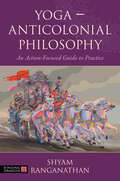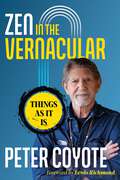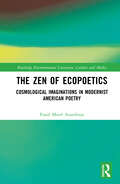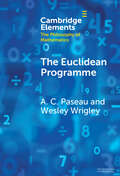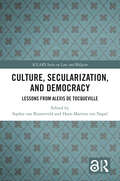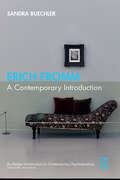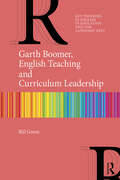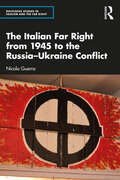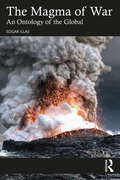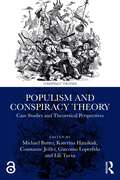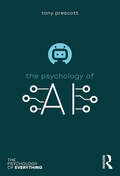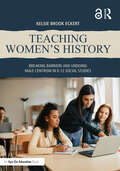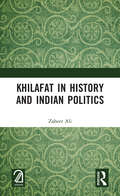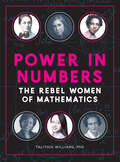- Table View
- List View
Yoga – Anticolonial Philosophy: An Action-Focused Guide to Practice
by Shyam RanganathanProviding a decolonial, action-focused account of Yoga philosophy, this practical work from Dr. Shyam Ranganathan, pioneering scholar in the field of Indian moral philosophy, focuses on the South Asian tradition to explore what Yoga was like prior to colonization. It challenges teachers and trainees to reflect on the impact of Western colonialism on Yoga as well as understand Yoga as the original decolonial practice in a way that is accessible. Each chapter takes the reader through a journey of sources and traditions, beginning with an investigation into the colonial -Platonic and Aristotelian- approaches to pedagogy in colonized yoga spaces, through contrary, ancient philosophies of South Asia, such as Jainism, Buddhism, Sankhya, and various forms of Vedanta, to sources of Yoga, including the Upanisads, Yoga Sutra, Bhagavad Gita and Hatha Yoga Pradipika. With discussions of the precolonial philosophy of Yoga, its relationship to social justice, and modern postural yoga's relationship with colonial trauma, this is a comprehensive guide for any yoga teacher or trainee to activate and synergize their practice. Supplementary online resources bring the text to life, making this the perfect text for yoga teacher trainings.
Zen in the Vernacular: Things As It Is
by Peter Coyote• Shows how Zen offers a creative problem-solving mechanism and moral guide ideal for the stresses and problems of daily life• Shares the author&’s secular, vernacular interpretations of the Four Noble Truths, the Three Treasures, the Eightfold Path, and other fundamental Buddhist ideasDuring the nearly 3,000 years since the Buddha lived, his teachings have spread widely around the globe. In each culture where Buddhism was introduced, the Buddha&’s teachings have been pruned and modified to harmonize with local customs, laws, and cultures. We can refer to these modifications as &“gift wrapping,&” translating the gifts of Buddha&’s teachings in ways sensible to particular cultures in particular times. This gift-wrapping explains why Indian, Tibetan, Vietnamese, Japanese, Chinese, and Indonesian Buddhism have significant differences.In this engaging guide to Zen Buddhism, award-winning actor, narrator, and Zen Buddhist priest Peter Coyote helps us peer beneath the Japanese gift-wrapping of Zen teachings to reveal the fundamental teachings of the Buddha and show how they can be applied to contemporary daily life. The author explains that the majority of Western Buddhists are secular and many don&’t meditate, wear robes, shave their heads, or believe in reincarnation. He reminds us that the mental/physical states achieved by Buddhist practice are universal human states, ones we may already be familiar with but perhaps never considered as possessing spiritual dimensions.Exploring Buddha&’s core teachings, the author shares his own secular and accessible interpretations of the Four Noble Truths, the Three Treasures, and the Eightfold Path within the context of his lineage and the teachings of his teacher and the teachers before him. He looks at Buddha&’s teachings on our singular reality that appears as a multiplicity of things and on the &“self&” that perceives reality, translating powerful spiritual experience into the vernacular of modern life.Revealing the practical usefulness of Buddhist philosophy and practice, Zen in the Vernacular shows how Zen offers a creative problem-solving mechanism and moral guide ideal for the stresses and problems of everyday life.
The Zen of Ecopoetics: Cosmological Imaginations in Modernist American Poetry (Routledge Environmental Literature, Culture and Media)
by Enaiê Mairê AzambujaThis book is the first comprehensive study investigating the cultural affinities and resonances of Zen in early twentieth-century American poetry and its contribution to current definitions of ecopoetics, focusing on four key poets: William Carlos Williams, Marianne Moore, Wallace Stevens, and E.E. Cummings. Bringing together a range of texts and perspectives and using an interdisciplinary approach that draws on Eastern and Western philosophies, including Zen and Taoism, posthumanism and new materialism, this book adds to and extends the field of ecocriticism into new debates. Its broad approach, informed by literary studies, ecocriticism, and religious studies, proposes the expansion of ecopoetics to include the relationship between poetic materiality and spirituality. It develops ‘cosmopoetics’ as a new literary-theoretical concept of the poetic imagination as a contemplative means to achieving a deeper understanding of the human interdependence with the non-human. Addressing the critical gap between materialism and spirituality in modernist American poetry, The Zen of Ecopoetics promotes new forms of awareness and understanding about our relationship with non-human beings and environments. It will be of interest to scholars, researchers, and students in ecocriticism, literary theory, poetry, and religious studies.
The Euclidean Programme (Elements in the Philosophy of Mathematics)
by null A. C. Paseau null Wesley WrigleyThe Euclidean Programme embodies a traditional sort of epistemological foundationalism, according to which knowledge – especially mathematical knowledge – is obtained by deduction from self-evident axioms or first principles. Epistemologists have examined foundationalism extensively, but neglected its historically dominant Euclidean form. By contrast, this book offers a detailed examination of Euclidean foundationalism, which, following Lakatos, the authors call the Euclidean Programme. The book rationally reconstructs the programme's key principles, showing it to be an epistemological interpretation of the axiomatic method. It then compares the reconstructed programme with select historical sources: Euclid's Elements, Aristotle's Posterior Analytics, Descartes's Discourse on Method, Pascal's On the Geometric Mind and a twentieth-century account of axiomatisation. The second half of the book philosophically assesses the programme, exploring whether various areas of contemporary mathematics conform to it. The book concludes by outlining a replacement for the Euclidean Programme.
Culture, Secularization, and Democracy: Lessons from Alexis de Tocqueville (ISSN)
by Sophie van Bijsterveld and Hans-Martien ten NapelFollowing the approach developed by Alexis de Tocqueville, this volume views democracy as a cultural phenomenon. It starts from the assumption that if we are to adequately address concerns about the current state and future of modern Western democracies, we need first to tackle the cultural preconditions necessary for the functioning of a democracy.Since Tocqueville’s time, the book takes the most crucial change in the West to be ‘double secularisation’. Here, this concerns, first, the diminished influence of organised Christianity. Even though secularity was partly a product of Christianity, secularisation is highly significant in terms of the cultural underpinnings of Western democracy. Second, it involves a decreased interest in and knowledge of classical philosophy.Chapters on secularity, family life, civic life, and public spirit focus on central elements of the changed cultural foundation of democracy, exploring issues such as identity politics, the public space, and the role of human rights and natural law in a pluralistic and resilient democracy. The volume concludes with a closer look at the implications of current presentism, that is, the view that only the present counts for the legitimacy and effectiveness of democratic systems. Finally, it asks if double secularisation can also offer fresh opportunities for promoting the conditions of a viable democracy.The book will be of interest to academics and researchers working in the areas of law and religion, constitutional law, political science, history, and philosophy.
Erich Fromm: A Contemporary Introduction (Routledge Introductions to Contemporary Psychoanalysis)
by Sandra BuechlerIn this passionate volume, Sandra Buechler introduces Erich Fromm's groundbreaking contributions to psychoanalysis, sociology, philosophy, political action, and social criticism. | Buechler explores how Fromm's thinking and interdisciplinary vision are able to frame discussions of dilemmas in contemporary society. She offers a comprehensive biography of Fromm, before delving into his role as analyst, author, activist, sociologist and philosopher. From her own experience as a psychoanalyst, and from the testimony of Fromm's many ardent followers, Buechler illuminates Fromm's capacity to inspire. She considers how Fromm's writing equips students, beginning clinicians and more experienced professionals to understand what can give meaning to their efforts on behalf of troubled individuals, their riven communities, and the wider world. | Assuming no prior knowledge of Fromm's work, this books offers students in clinical and social psychology, sociology, and philosophy a vital insight into his theoretical contributions. It will also be of interest to psychoanalysts, psychologists and social workers.
Garth Boomer, English Teaching and Curriculum Leadership (Key Thinkers in English in Education and the Language Arts)
by Bill GreenThis book provides a broad introduction to the critical work of leading Australian educator Garth Boomer, widely recognised as a significant figure in English teaching. This insightful text provides an accessible introduction to his work, with particular reference to English curriculum and pedagogy, and provides a fascinating account of his journey as a scholar-practitioner, from classroom teaching to the highest levels of the educational bureaucracy.Bill Green explores Boomer’s huge influence on literacy education, teacher development, curriculum inquiry, and educational policy, and critically asks why Boomer’s insights and arguments about English teaching from the last century have such importance for the field now. This text also focuses on the nature and significance of his curriculum thinking, specifically his arguments and provocations regarding English teaching, the English classroom, and the contexts that infuse and shape them. It constitutes a rich resource for rethinking English teaching in the present day and provides an important contribution to the historical imagination.With all due consideration of the larger context of social life and educational thought, this text will help any student of English in Education and Language Arts obtain a deeper understanding of Boomer’s vital contribution to the field of education.
The Italian Far Right from 1945 to the Russia-Ukraine Conflict (Routledge Studies in Fascism and the Far Right)
by Nicola GuerraThe Italian Far Right from 1945 to the Russia–Ukraine Conflict provides a comprehensive account of the postwar parliamentary and extra parliamentary far right in Italy. This book explores the ideology, movements and activism of the extreme right and neo- fascists. The recent victory in the Italian parliamentary elections of the ‘postfascist’ party Fratelli d’Italia and its leader Giorgia Meloni highlights the importance of such research. The book examines why some of these movements participated with CIA- backing in the ‘Strategy of Tension’ in the years of the Cold War where terrorist actions aimed to keep Italy in NATO and prevent the Communist Party from coming to power, while other extreme- right groups vehemently opposed this and what they considered the dangerous ‘Americanization’ of the country. It debunks the myth that there was a unified postwar fascist movement in Italy, but instead excavates the complex battles within the extreme right as well as with their opponents from the left, and the authorities. This study is necessary to clarify the history and ideological dynamics of a political area still too often shrouded in mystery and whose geopolitical role is still poorly understood and generally underestimated. The analysis is contextualized in the present day by looking at the different perspectives of the Italian far right on the Russian invasion of Ukraine. The book will be of interest to researchers of political history, the Cold War and Italian history and politics.
The Magma of War: An Ontology of the Global
by Edgar IllasWar, from the conflicts in the Middle East and Russia/Ukraine to Mexican narco-violence, from neocolonial land grabs in the Global South to racial, border, health, and climate crises all over the planet, defines the most extreme and contradictory expression of the global world. In this fascinating exploration on the history of the thinking of conflict, Edgar Illas departs from military and sociological analyses to propose a theoretical exploration of war as the ontological force that produces political orders.Magma is used as a geological metaphor to theorize the mixtures of politics and war that organize, and disorganize, global society. Divided into two parts, Illas’ study begins by surveying some of the most important thinkers of war, moving from classical antiquity to the twentieth century. Each thinker provides a different inflection in the historical evolution of the being of war. The second part turns to a theorization of the twenty-first century to claim that conflictive relations between capital, state power, political movements, and social life in globalization culminate and at the same time reiterate the paradoxes of war as an ontological event.The Magma of War is an energizing contribution to the task of rethinking politics in relation to war and an invaluable resource to all those conscious of the unstable forms of contemporary social and political life.
Populism and Conspiracy Theory: Case Studies and Theoretical Perspectives (Conspiracy Theories)
by Michael Butter Giacomo Loperfido Katerina Hatzikidi Constanze Jeitler Lili TurzaThis book explores the close connections between populism and conspiracy theory. Populism and Conspiracy Theory contributes to filling the gap in the research in this area. The individual contributions in Part I provide in-depth analyses of specific configurations of populism and conspiracy theory. Part II includes nuanced considerations of more theoretical issues. The case studies cover both right-wing and left-wing manifestations of populism, while highlighting that populist movements often cut across the traditional left-right divide. Chapters focus on the twenty-first century and the first half of the twentieth century, as well as the impact of history and memory on contemporary discourses. Geographically, the case studies consider the Americas as well as Europe and Northern Africa. Theoretical discussions include the aesthetics and forms of populist conspiracism, or its dependence on new media. The disciplines represented in the volume range from political science and sociology via anthropology and history to linguistics and cultural studies.It will appeal to those interested in politics, specifically conspiracy theory, populism, democracy, and leadership.The Open Access version of this book, available at www.taylorandfrancis.com, has been made available under a Creative Commons Attribution‑Non Commercial‑No Derivatives (CC‑BY‑NC‑ND) 4.0 license.
The Psychology of Artificial Intelligence (The Psychology of Everything)
by Tony PrescottWhat is Artificial Intelligence? How will AI impact society? Is AI more powerful than human intelligence?The Psychology of AI explores all aspects of the psychology–AI relationship, asking how closely AI can resemble humans, and whether this means they could have some form of self-awareness. It considers how AI systems have been modelled on human intelligence and the similarities between brains and computers, along with the current limitations of AI and how these could be overcome in the future. It also looks at how people interact with AI in their everyday lives, exploring some of the ethical and societal risks, such as bias in AI algorithms, and the consequences for our long-term future if AIs do surpass humans in important ways.As AI continues to break new milestones, The Psychology of AI answers key questions about what it really means to be human, and how AI will impact our lives in every way, now and into the future.
Teaching Women's History: Breaking Barriers and Undoing Male Centrism in K-12 Social Studies
by Kelsie Brook EckertTeaching Women’s History: Breaking Barriers and Undoing Male Centrism in K-12 Social Studies challenges and guides K-12 history teachers to incorporate comprehensive and diverse women’s history into every region and era of their history curriculum.Providing a wealth of practical examples, ideas, and lesson plans – all backed by scholarly research – for secondary and middle school classes, this book demonstrates how teachers can weave women’s history into their curriculum today. It breaks down how history is taught currently, how teachers are prepared, and what expectations are set in state standards and textbooks and then shows how teachers can use pedagogical approaches to better incorporate women’s voices into each of these realms. Each chapter explores a major barrier to teaching an inclusive history and how to overcome it, and every chapter ends with an inquiry-based lesson plan on women or using women's sources which stands counter to the way curriculum is traditionally taught, a case in point that tasks readers to realize how women have been integral to every period of history.With expert guidance from an award-winning social studies teacher, this guidebook will be important reading for middle and high school history educators. It will also be beneficial to preservice teachers, particularly within Social Studies Education and Gender Studies.Additional resources for educators are available to view at www.remedialherstory.com.
Khilafat in History and Indian Politics
by Zaheer AliThis book is a brief historical account of Khilafat, an Islamic political institution mired in controversies from its inception. It is an attempt to present an objective critique of the Islamic polity that, in a way, was primarily responsible for crafting schisms in Islam with its commencement. By the time the last Khilafat of the Ottomans came to an end in the aftershock of the Second World War, the Muslim political elite in India launched a movement for the restoration and continuation of the Ottoman Khilafat. The most paradoxical dimension of the issue was that in the Arab peninsula, the epicenter of Islam, the people were struggling to cast away the yoke of the Ottoman Khilafat, then why were the Indian Muslims emotionally involved in a movement that was vehemently condemned and assailed by a majority of Muslims outside the Indian subcontinent? This title is co-published with Aakar Books. Print editions not for sale in South Asia (India, Sri Lanka, Nepal, Bangladesh, Pakistan and Bhutan)
Power in Numbers: The Rebel Women of Mathematics
by Talithia WilliamsFrom rocket scientists to code breakers, “fascinating stories” of women who overcame obstacles, shattered stereotypes, and pursued their passion for math (Notices of the American Mathematical Society).With more than 200 photos and original interviews with several of the amazing women covered, Power in Numbers: The Rebel Women of Mathematics is a full-color volume that puts a spotlight on the influence of women on the development of mathematics over the last two millennia. Each biography reveals the life of a different female mathematician, from her childhood and early influences to the challenges she faced and the great achievements she made in spite of them. Learn how:After her father terminated her math lessons, Sofia Kovalevskaya snuck algebra books into her bed to read at nightEmmy Noether became an invaluable resource to Albert Einstein while she was in the NavyNative American rocket scientist Mary Golda Ross developed designs for fighter jets and missiles in a top-secret unitKatherine Johnson’s life-or-death calculations at NASA meant that astronauts such as Alan Shepard and John Glenn made it home aliveShakuntala Devi multiplied massive numbers in her head so her family could eat at nightPamela Harris proved her school counselors wrong when they told her she would only succeed as a bilinguial secretaryCarla Cotwright-Williams began her life in the dangerous streets of South-Central Los Angeles before skyrocketing to a powerful career with the Department of Defense in Washington, DCThese women are a diverse group, but their stories have one thing in common: At some point on their journeys, someone believed in them—and made them think the impossible was perhaps not so impossible.“A quick read . . . full of dramatic stories and eye-catching illustrations.” —MAA Reviews“I found myself marveling at the personal anecdotes and quotes throughout the book.” —Notices of the American Mathematical Society
